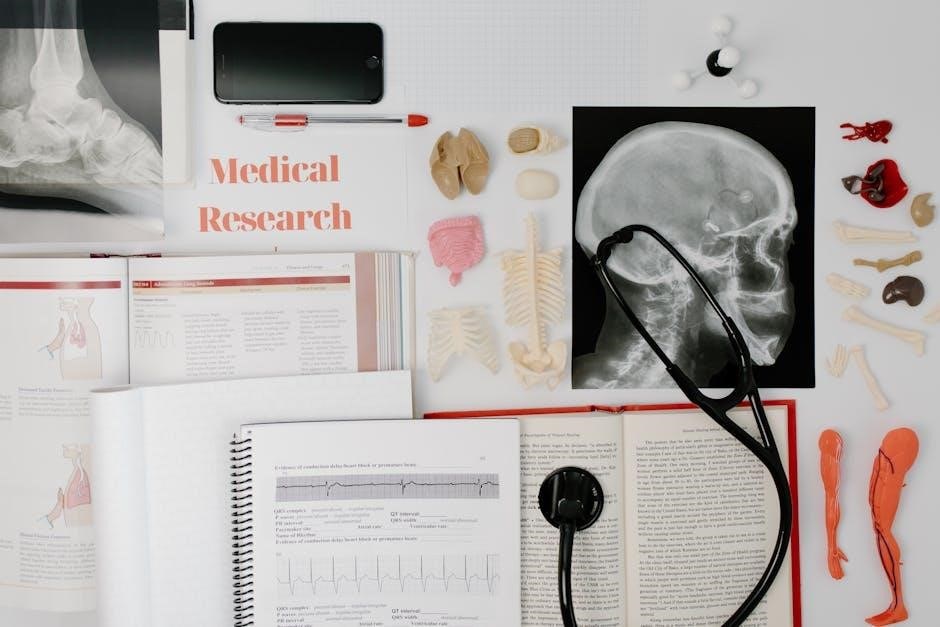Benefits of Using Year 7 Science Test Papers with Answers
Year 7 Science test papers with answers enhance understanding, improve exam readiness, and provide feedback․ They familiarize students with exam formats, assess knowledge, and build confidence for better performance․
1․1 Understanding the Importance of Practice Tests
Practice tests help students reinforce learning, identify knowledge gaps, and refine test-taking skills․ They simulate exam conditions, improving time management and accuracy․ Regular practice builds familiarity with question formats and reduces anxiety, ensuring students are better prepared for actual assessments․
1․2 How Answer Keys Enhance Learning
Answer keys provide immediate feedback, helping students identify mistakes and understand correct solutions․ They clarify complex concepts, reinforce learning, and allow self-assessment․ By reviewing answers, students can track progress, address weaknesses, and gain confidence in their understanding of scientific principles and exam strategies․

Popular Formats of Year 7 Science Test Papers
Year 7 Science test papers often feature multiple-choice questions, open-response questions, and mixed-format assessments․ These formats test knowledge, critical thinking, and problem-solving skills, preparing students for diverse exam scenarios․
2․1 Multiple-Choice Questions (MCQs)
Multiple-Choice Questions (MCQs) are a common format in Year 7 Science test papers․ They present students with a question and several answer options, promoting quick recall and critical thinking․ MCQs cover topics like biology, chemistry, and physics, helping students prepare for exams by familiarizing them with structured question formats and reducing anxiety․
2․2 Open-Response Questions
Open-response questions require students to provide detailed, explanatory answers, fostering critical thinking and in-depth understanding․ These questions often cover complex topics like ecosystems or cell structures, encouraging students to articulate their knowledge clearly․ They help students prepare for more challenging assessments and allow teachers to evaluate reasoning and clarity effectively․
2․3 Mixed-Format Assessments
Mixed-format assessments combine multiple question types, such as MCQs, short answers, and essays, to evaluate a wide range of skills․ They promote critical thinking, application of knowledge, and problem-solving․ This format prepares students for diverse exam questions, enhancing their readiness, adaptability, and overall performance in science exams․
Key Topics Covered in Year 7 Science Test Papers
Year 7 science test papers cover biology, chemistry, and physics․ Topics include cells, ecosystems, basic elements, forces, energy, and motion, ensuring a comprehensive understanding of foundational concepts․
3․1 Biology: Cells, Ecosystems, and Life Processes
Year 7 biology test papers focus on cells, ecosystems, and life processes․ Topics include cell structure and function, photosynthesis, food chains, habitats, and human impacts on ecosystems․ Students learn to understand interactions within ecosystems and apply scientific knowledge to conservation and sustainability, fostering a deeper appreciation for biological systems and their interconnectedness․
3․2 Chemistry: Basic Elements and Compounds
Year 7 chemistry test papers cover fundamental concepts such as elements, compounds, and the periodic table․ Students explore chemical symbols, basic reactions, and conservation of mass․ These papers help reinforce understanding of atomic structure and chemical interactions, preparing students for more complex topics in later years and improving their problem-solving skills․
3․3 Physics: Forces, Energy, and Motion
Year 7 Physics test papers focus on understanding forces, motion, and energy․ Students analyze graphs, calculate speed, and explore energy types․ They apply principles to real-world scenarios, understanding Newton’s laws and energy conservation․ These papers improve problem-solving skills, preparing students for advanced physics topics and fostering a deeper grasp of physical phenomena․

Where to Find Free Year 7 Science Test Papers with Answers
Educational websites, school resources, and open-access platforms offer free Year 7 Science test papers with answers․ Websites like IXL, Khan Academy, and institutional repositories provide comprehensive materials for students and educators․
4․1 Educational Websites and Repositories
Educational websites like IXL, Khan Academy, and Science Learning Hub offer free Year 7 Science test papers with answers․ These platforms provide comprehensive practice tests, answer keys, and study materials in PDF formats, making them easily accessible for students and educators․
4․2 School and Institutional Resources
Schools and educational institutions often provide Year 7 Science test papers with answers through their portals or repositories․ These resources include past papers, revision guides, and practice tests in PDF format, curated by teachers to support student learning and exam preparation effectively․
4․3 Open-Access Platforms for Students
Open-access platforms offer free Year 7 Science test papers with answers in PDF format, enabling students to access high-quality resources without restrictions․ These platforms, such as educational repositories and online libraries, provide a wide range of practice materials to aid in exam preparation and reinforce learning outcomes effectively․
Strategies for Effective Use of Practice Tests
Effective use involves timed practice, analyzing mistakes, and simulating exam conditions to improve performance and build confidence for Year 7 Science assessments․
5․1 Time Management Techniques
Allocate specific time for each question, prioritize challenging sections, and practice under timed conditions․ This enhances speed, accuracy, and ensures thorough completion of Year 7 Science test papers․
5․2 Reviewing and Analyzing Mistakes
Identify errors in test papers, understand incorrect responses using answer keys, and learn from them․ Regular reviews help students grasp common pitfalls, refine concepts, and improve problem-solving skills, ensuring better performance in subsequent exams․
5․3 Simulating Exam Conditions
Simulate exam conditions by setting timers and creating a quiet environment․ Use test papers to practice under realistic pressure, helping students adapt to the exam format․ This builds time management skills, reduces anxiety, and enhances familiarity with the test structure, leading to improved performance in actual exams․
Common Question Types in Year 7 Science Exams
Year 7 science exams include multiple-choice questions, short answers, and essay-type responses․ Diagram-based questions also appear, testing students’ ability to interpret and explain scientific concepts visually․
6․1 Short Answer Questions
Short answer questions require concise responses, testing specific knowledge and understanding․ They assess the ability to explain scientific concepts clearly․ Students can use test papers to practice these questions, improving their ability to articulate thoughts effectively and prepare for exam scenarios․
6․2 Essay-Type Questions
Essay-type questions assess in-depth understanding and critical thinking․ They require detailed explanations and structured responses․ Practicing with Year 7 Science test papers helps students develop clear, logical answers and improves their ability to articulate scientific concepts effectively under exam conditions․
6․3 Diagram-Based Questions
Diagram-based questions test visual understanding and practical skills․ Students interpret or complete diagrams to answer questions, enhancing their ability to apply scientific concepts visually․ Regular practice with Year 7 Science test papers improves problem-solving skills and familiarity with exam formats, reducing anxiety and improving performance in diagram-related tasks․
Tips for Improving Science Test Performance
Use active recall, spaced repetition, and flashcards to reinforce key concepts․ Engage in regular practice, review mistakes, and participate in peer discussions to deepen understanding and improve results․
7․1 Active Recall and Spaced Repetition
Active recall involves testing yourself on key concepts without notes, enhancing memory retention․ Spaced repetition schedules reviews over time, preventing forgetting․ Both techniques, when applied to Year 7 Science test papers, improve knowledge retention and prepare students for exams effectively․
7․2 Using Flashcards for Key Terms
Flashcards are effective for memorizing key science terms and concepts․ Write the term on one side and the definition or explanation on the other․ Regularly reviewing flashcards helps reinforce memory and improves quick recall of important information during exams․
7․3 Engaging in Peer Discussions
Engaging in peer discussions encourages active learning and clarifies doubts․ Students can exchange ideas, explain concepts to each other, and gain diverse perspectives․ Regular discussions foster teamwork, improve communication skills, and reinforce scientific understanding, helping students feel more confident in their knowledge and problem-solving abilities․

The Role of Teachers and Parents in Test Preparation
Teachers and parents play a crucial role by providing guidance, creating study environments, and offering feedback․ They help students identify weaknesses, encourage independent learning, and build confidence, fostering academic growth and resilience․
8․1 Providing Guidance and Support
Teachers and parents provide structured guidance, helping students interpret complex concepts and apply knowledge effectively․ They offer tailored support, ensuring understanding and motivation, while also recommending resources like study guides or digital tools to enhance learning and test preparation strategies․
8․2 Encouraging Independent Study
Teachers and parents promote self-directed learning by encouraging students to use digital resources and educational apps․ Access to past papers with answers fosters independent practice, allowing students to review and master concepts at their own pace, reinforcing learning and preparing for exams effectively․
8․3 Offering Feedback and Correction
Teachers and parents provide detailed feedback on test papers, helping students identify errors and improve understanding․ Correcting mistakes and explaining concepts ensures clarity, while highlighting common pitfalls guides focused study, fostering better grasp of science concepts and exam preparedness․

Avoiding Common Mistakes in Science Tests
Common mistakes include misreading questions, poor time management, and guessing without reasoning․ Encourage careful reading, strategic time allocation, and informed answering to minimize errors and improve scores․
9․1 Misreading Questions
Misreading questions is a common mistake․ Students often skim through problems quickly, missing key details․ Encourage slow, deliberate reading and highlighting important terms to ensure full understanding before answering, minimizing errors caused by oversights or misunderstandings․
9․2 Time Mismanagement
Time mismanagement is a frequent issue, where students spend too long on one question, leaving insufficient time for others․ This leads to rushed answers and missed questions․ Encourage allocating specific time per question and moving forward if stuck to ensure all sections are attempted, maximizing potential scores and reducing anxiety․
9․3 Guesswork Without Reasoning
Guesswork without reasoning often leads to incorrect answers and lower scores․ Students should avoid blind guessing and instead think logically through each question, using prior knowledge to make informed decisions․ This approach minimizes errors and enhances test performance in science exams by promoting better understanding and application of concepts․
Leveraging Technology for Test Preparation
Technology enhances test preparation with educational apps, online simulators, and digital flashcards․ These tools provide interactive learning experiences, helping students track progress and reinforce science concepts effectively․
10․1 Educational Apps and Tools
Educational apps and tools offer interactive learning experiences, such as IXL, which provides comprehensive science practice tests․ These platforms engage students with quizzes, simulations, and progress tracking, making test preparation enjoyable and effective while reinforcing key concepts and skills for Year 7 science exams․
10․2 Online Simulators and Labs
Online simulators and virtual labs provide interactive learning experiences, enabling Year 7 students to explore scientific concepts through experiments․ Platforms like PhET and Labster offer engaging, hands-on activities that complement test papers, allowing students to visualize processes and reinforce their understanding of key science topics effectively․
10․3 Digital Flashcards and Quizzes
Digital flashcards and quizzes offer interactive ways to revise science topics․ Platforms like Quizlet provide sets of key terms and concepts, while Kahoot! enables fun, competitive learning․ These tools help students memorize facts, assess their knowledge, and identify areas for improvement through self-paced, engaging exercises․

Building Confidence for Science Exams
Consistent practice with test papers and positive reinforcement build confidence․ Students gain self-assurance by mastering concepts and seeing progress, fostering a mindset ready for exam success․
11․1 Positive Mindset and Self-Belief
Cultivating a positive mindset and fostering self-belief are crucial for exam success․ Encouraging students to embrace challenges and celebrate progress builds resilience․ Practice test papers with answers help students track improvements, reinforcing their confidence and belief in their abilities to excel in science exams․
11․2 Regular Practice and Reinforcement
Regular practice with Year 7 science test papers reinforces learning, improves retention, and prepares students for exams․ Consistent use of test papers helps identify weak areas, builds problem-solving skills, and ensures familiarity with exam formats, fostering confidence and readiness for assessment․
11․3 Celebrating Small Achievements
Celebrating small achievements in science test preparation boosts confidence and motivation․ Recognizing progress, even in minor areas, encourages students to stay positive and persistent․ Acknowledging improvements fosters a growth mindset, helping students approach exams with optimism and a stronger belief in their abilities, leading to better overall performance․

Final Tips for Year 7 Science Test Success
Stay organized, practice consistently, and manage time wisely․ Seek help when needed and review mistakes to improve․ Confidence and preparation are key to achieving success․
12․1 Staying Organized and Focused
Staying organized and focused is crucial for effective test preparation․ Create a study schedule, use to-do lists, and prioritize tasks․ Maintain a clean, distraction-free study area and set specific goals for each session․ Regular breaks and a clear plan help maintain concentration and ensure consistent progress toward exam success․
12․2 Balancing Study and Relaxation
Balancing study and relaxation is essential for maintaining productivity and mental well-being․ Allocate specific time for learning and regular breaks to recharge․ Engage in physical activities or hobbies to reduce stress․ A well-rested mind absorbs information more effectively, ensuring a healthy and sustainable approach to exam preparation and overall success․
12․3 Seeking Help When Needed
Seeking help when needed is crucial for understanding complex topics․ Students should approach teachers, parents, or peers for clarification․ Joining study groups or using online resources can also provide additional support․ Asking for help early prevents confusion and boosts confidence, leading to better test performance and overall success․ Utilize available resources like study guides or tutoring sessions to enhance learning․
